Multi-use development featuring retail and mixed-use housing fuels neighborhood's resurgence
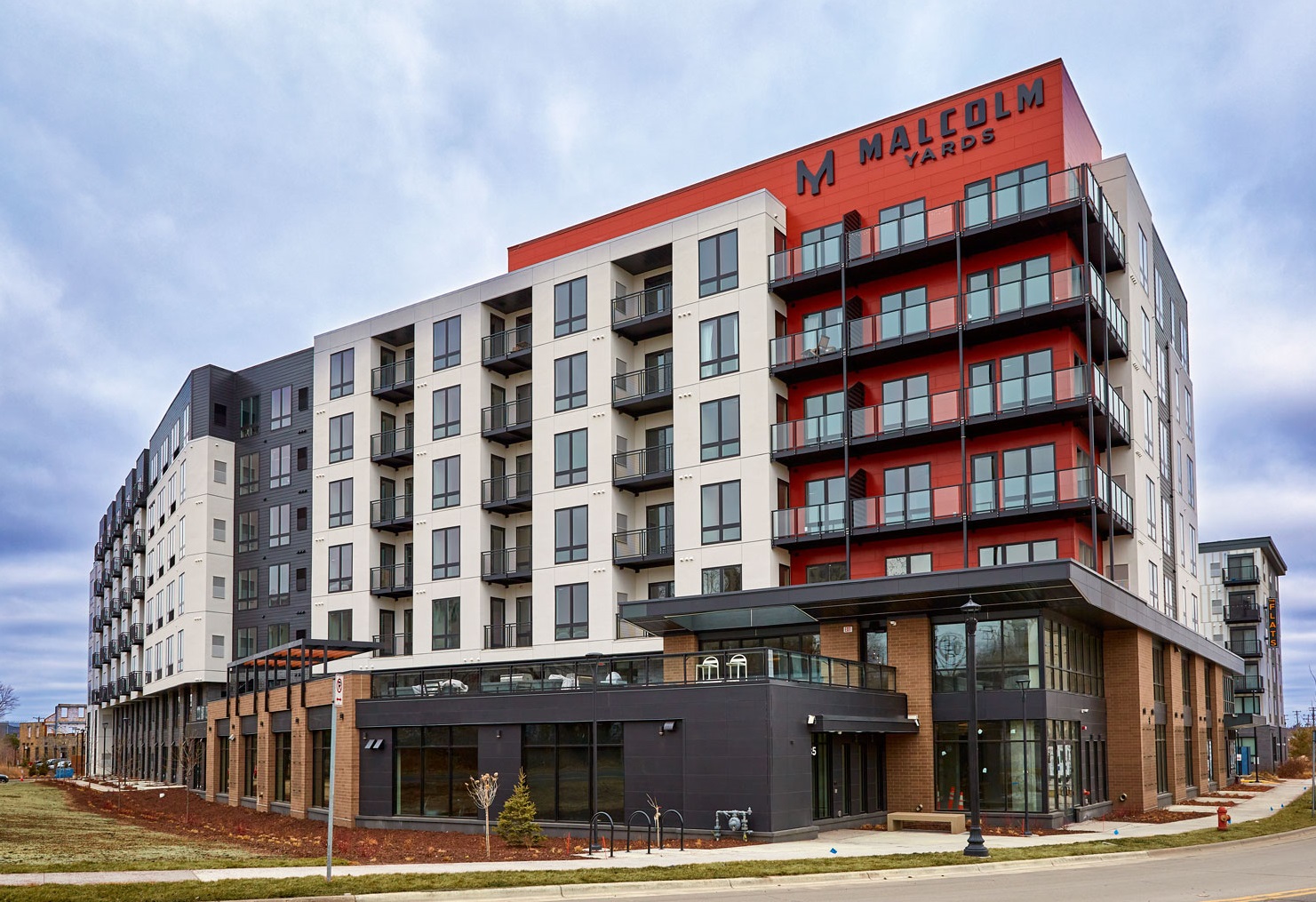 The Station Apartments at Malcolm Yards
The Station Apartments at Malcolm Yards
More than 20 years ago, developer John Wall, President of The Wall Companies, had a vision for turning a former industrial site in Minneapolis’ edge businesses tapping into research coming out of the University of Minnesota.
It made perfect sense on paper, so Wall started acquiring land. The university’s East Bank campus was nearby and a research park was an ideal fit for the city’s zoning vision for the neighborhood. Much to Wall’s disappoint, the concept struggled to gain traction. In the meantime, the neighborhood was beginning to transition into a more walkable and livable community as new housing developments began sprouting up along the METRO Green Line light rail with food and beverage establishments, such as Surly Brewing and O’Shaughnessy Distilling, and other retailers filling in the area. After years of effort focused on executing his original plan, Wall decided to pivot to accommodate the area’s changing needs.
Today, Wall’s site is a bustling multi-use development commonly known as Malcolm Yards. It started with John and Patty Wall’s innovative idea to redevelop the 19,000-square-foot historic Harris Machinery building into a food hall, The Market at Malcolm Yards. This was followed by the development of a 143-unit affordable apartment building called The Flats, which opened in June of 2023 and was filled within 90 days.
The most recent addition is The Station at Malcolm Yards, a 210-unit, market-rate apartment building. Supply chain issues delayed its opening until December 2023, but that didn’t seem to have hurt demand.
“Yesterday, we had 11 showings,” said Wall, president of The Wall Cos. “People like the neighborhood. They like the project. We’ve been flattered at the reception it’s received.”
The building offers spaces for social gatherings, including a sky lounge and deck with a picturesque view of the Downtown Minneapolis skyline, indoor community room, media room and coffee bar. A fitness center, yoga room and bike storage support residents with their wellness goals, and the property is pet friendly, with a dog treat bar, pet spa and relief area. It also has coworking space, a business center and high-speed internet access for residents.
It complements The Flats and the rest of the neighborhood, Wall said.
“We do a lot of affordable housing and a fair amount of market-rate housing,” he said. “We like the mix. I’m a big proponent that the city needs affordable housing, in large part, to keep the city running smoothly.”
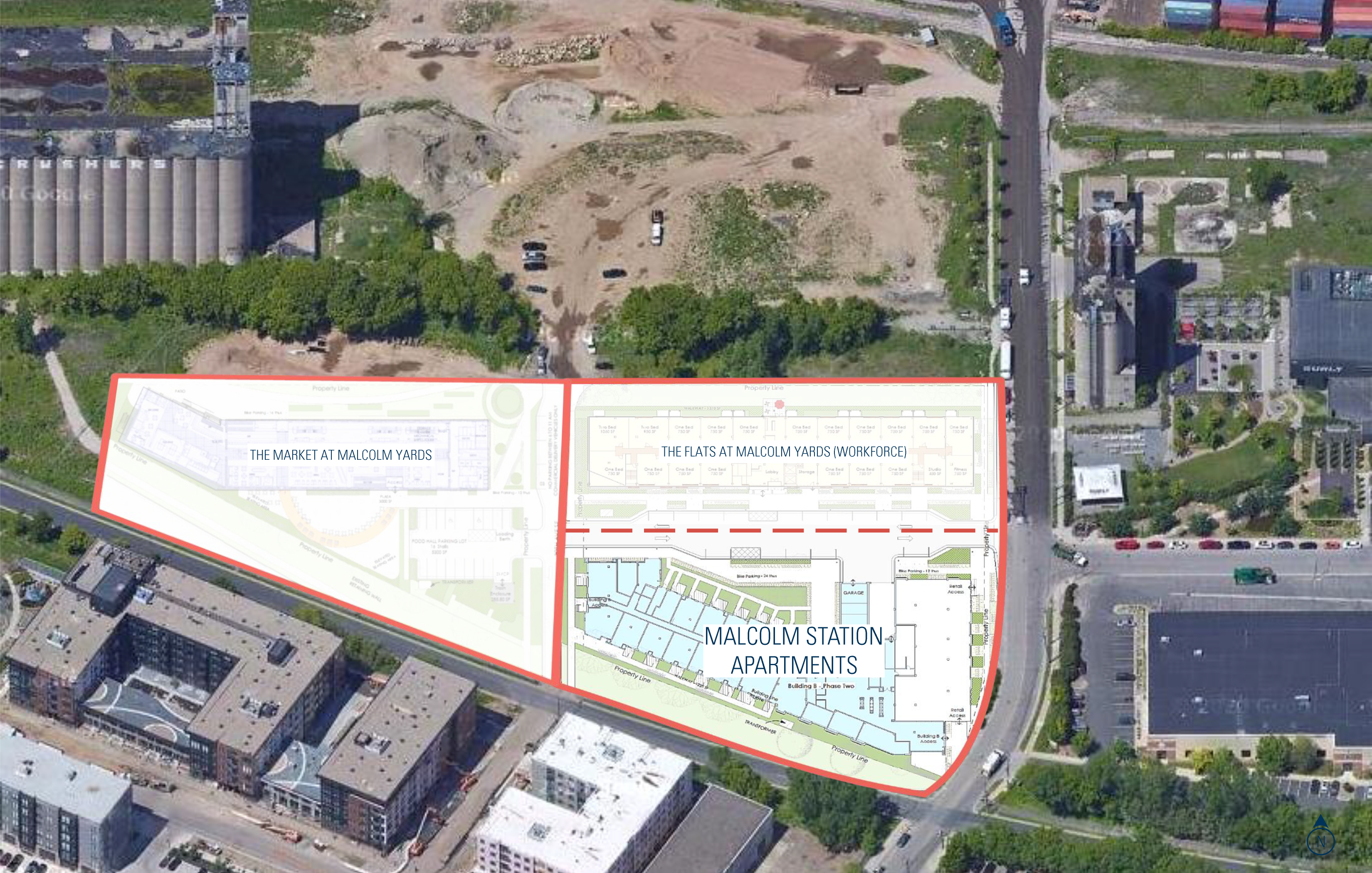 Aerial view of Malcolm Yards
Aerial view of Malcolm Yards
Bringing The Station to life
Launching The Station wasn’t entirely smooth. The project’s development required managing through removal of soil contamination on the site and pandemic-era supply chain issues during building construction. However, before contending with any of that, the greatest hurdle was securing construction financing for the project.
“It was a great location, great building, great team,” Wall said. “So I was surprised at how challenging it seemed to be to find financing.”
After a series of dead-ends, Wall reached out to a friend in the banking business for advice. The friend introduced him to Brian Stanley, a senior commercial banker with MidCountry Bank. Stanley was familiar with the property, having driven through the neighborhood as a student at the University of Minnesota several years back and witnessing the transformation in the area over his past 17+ years as a Twin Cities based commercial real estate lender.
“I called Brian up and shared my story and plans for the site,” Wall said. “He went to work on putting a loan proposal together for me from the bank and we got the deal done. It was awesome.”

Brian Stanley, Senior Commercial Banker at MidCountry Bank and John Wall, President of the Wall Companies
MidCountry Bank’s expertise in commercial real estate and a credit committee comprised of people familiar with the neighborhood were key differentiators. Due to the large size of the transaction, MidCountry brought in participants on the loan and managed that entire process in-house allowing Wall to remain focused on the development of the project. The bank closed on the financing at the end of 2021, working with Wall as he finalized the project budget amid rising lumber prices.
“Our focus is always community first and serving our customers in this market,” Stanley said. “We viewed it as a great site for this type of project. Getting John’s vision for what that site could become was exciting to us and something we wanted to be a part of.”
What’s next for Malcolm Yards
Wall’s plans for Malcolm Yards don’t end with The Station apartments. The Minneapolis Park and Recreation Board is adding a public park in front of the former United Crushers grain elevator and a bike trail that will connect to the Grand Rounds Minneapolis trail.
“The continued renaissance of this neighborhood will be fun to watch,” Stanley said.
“Witnessing this new urban infill community sprout up out of nowhere over the past decade has been incredible,” he said. “It’s fun to participate in helping create a vibrant community in an area that was somewhat blighted for quite some time and trying to figure out an identity. There’s certainly future opportunity to develop more on this site.”
Source: Minneapolis St. Paul Business Journal and Lauren Lawley Head – Contributor
_________________________________________________________________________________________________
South Lyndale Liquors expands on Campo family legacy
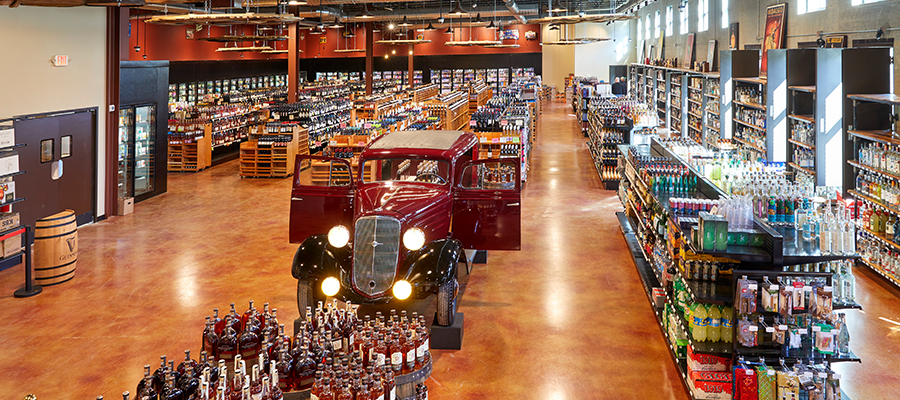
South Lyndale Liquors owner Dan Campo prides himself on having one of the largest selections of wine, bourbon, scotch, vodka, rum, agave spirits, craft beer and cordials in the Twin Cities. But that achievement sometimes comes at a price.
“I’m working from my home office today, because I can’t sit at my desk,” he said one day in September. “I’ve got boxes of bourbon packed underneath.”
The journey to a business that is now literally bursting at the seams started in the 1970s when Campo’s father, tired of his job as an on-the-road salesman and looking for a change, stumbled upon a newspaper article about changes in the laws governing where liquor stores could locate in the Twin Cities area. As someone passionate about wine, he saw the potential of opening a store that focused on bringing an incredible selection to southwest Minneapolis.
South Lyndale Liquors opened in 1975 and established itself as part of the neighborhood. Fast forward to 2007. The store was showing the wear and tear that comes with an aging owner who couldn’t quite keep up with the maintenance as he did 40 years earlier. It still had an unbeatable wine selection, and Campo saw the potential for more. He bought the business, financed his father’s retirement, and got to work.
As Campo worked in the business, he realized his passion for wine was not just about the beverage itself but about the way it could transport people to different parts of the world.
“On any regular Wednesday during the work week, you should be able to come into South Lyndale and buy an intriguing bottle of wine, be it from Italy, France or Spain, pair it with cheese and charcuterie and be able to taste and experience these wonderful flavors of the place you would like to be in,” he said. “It sort of transports you there without you actually having to jump on an airplane, fly there and then be back the next morning for work.”
Expanding to a new home
South Lyndale Liquors customers can now broaden their global culinary experience. The store recently moved from its almost-12,000-square-foot store on Lyndale Avenue South to a new building about two blocks away. The new store boasts over 34,000 square feet of retail space, complete with a 62- door beer cooler, a 20,000-bottle winder cellar, and a 1,000-bottle tasting wall, in addition to a warehouse basement for additional storage. The building’s architecture fits with the surrounding neighborhood, which was largely constructed in the 1920s, and the interior contains nods to the Prohibition era.
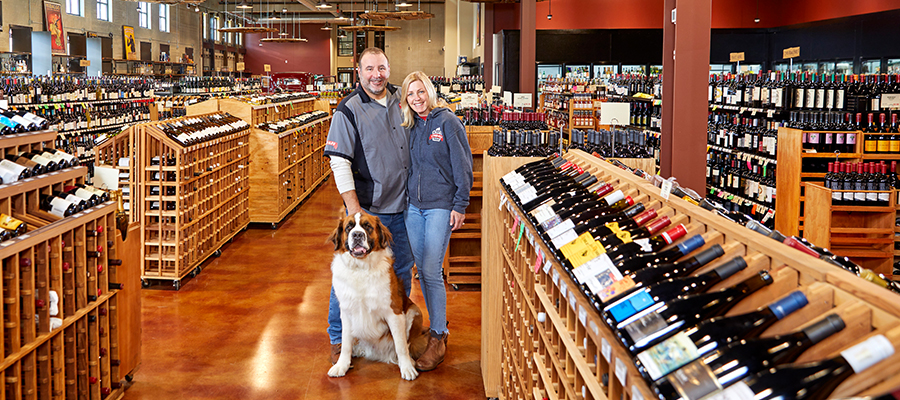
Dan Campo, Kate Campo and Magnus the dog at the new location of South Lyndale Liquors.
South Lyndale Liquors’ new home also has Brooklyn-style sandwiches, a finely curated deli, cheese, and charcuterie shop to complement its wine, beer and spirits offerings, fulfilling a dream of Campo’s parents. During the day, customers will be able to enjoy sandwiches and other delicious fare along with 24 different wines by the glass. In the evenings, the event space will host wine tastings and seminars about selections from lesser-known regions around the world.
“My parents, Italians from Brooklyn, had always talked about doing a cheese shop and a deli, but we could never fit it into the old building we had at the time,” Campo said. “Now, we’ll have this ability to do all of these travel and taste experiences within our own four walls.”
Campo spent nearly 10 years looking for the right location for the expansion. When he found it and started planning the new building, he realized the project was too big to tackle alone. He reached out to a longtime friend for advice, MidCountry Bank Chief Commercial Banking Officer Todd Streed. “Todd and I met years ago downhill skiing in Colorado. I’ve always liked his perspective on things, so I ran the project by him to get his thoughts.” Streed guided him through the financing process.
“It was an opportunity to partner with a well-established local business and help guide someone who is not in the bank financing space very frequently,” Streed said. "We work with sophisticated commercial real estate developers who know what’s possible and the financing process. Dan is thinking about his Italian wine and bourbon selections. Dan’s not thinking about what an SBA execution could look like versus a conventional structure.”
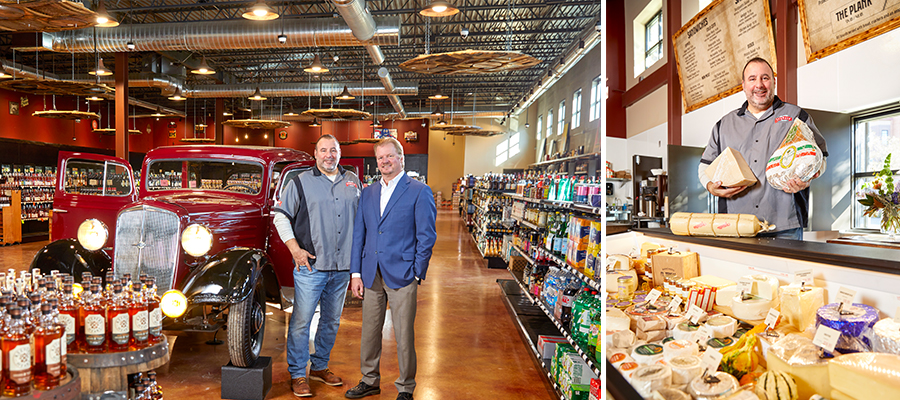
Dan Campo, owner of South Lyndale Liquors, and
MidCountry Bank’s Todd Streed, Chief Commercial Banking Officer
Streed worked with Campo to determine what type of project and financing the business could support. Being connected to the community was key, Streed said.
“Our decision-makers are in this marketplace,” he said. “They are familiar with the intersection of 55th and Lyndale Avenue South, and they are familiar with Dan’s business and his position in the marketplace. That’s the most granular that financing gets.”
Thanks to that partnership, Campo said, he gets to build his dream. “I took this neighborhood business and built it into my own store with a huge selection that highlights my passion for great libations and food. And now we’re becoming a destination.”
Source: Minneapolis St. Paul Business Journal and Lauren Lawley Head – Contributor
_________________________________________________________________________________________________
Perseverance Gets Credit for Longevity
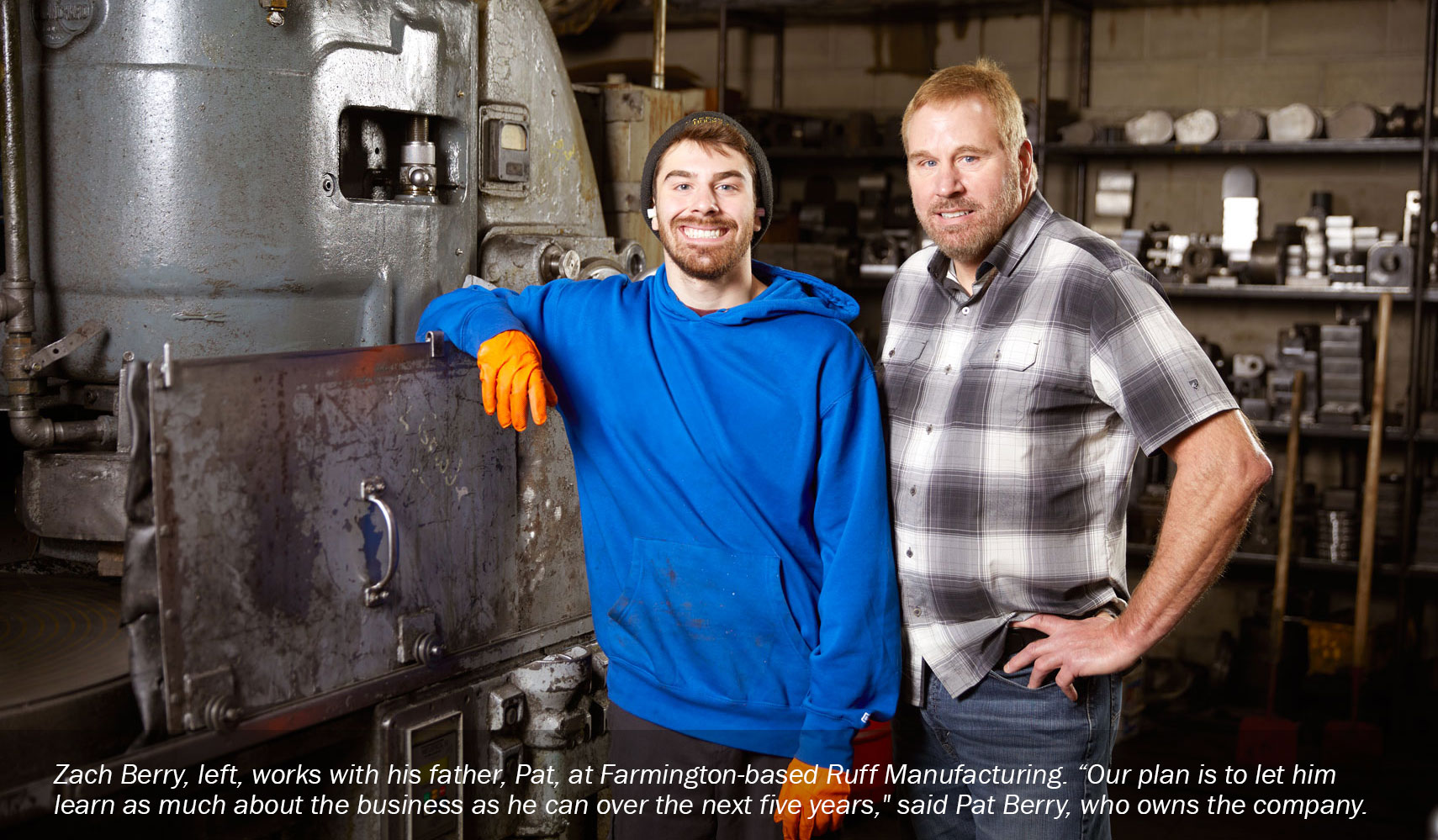
When Pat Berry says it’s hard to find people willing to work in the manufacturing trades, he’s speaking from experience. One recent hire walked out after just 15 minutes on the job.
“Believe it or not, yes,” said Berry, who owns Farmington-based Ruff Manufacturing. “I stepped away to do something, came back a few minutes later, and he was gone.”
Ruff Manufacturing is a heavy-steel fabricator and flame-cutting specialist, one of more than 700,000 manufacturing businesses in the U.S. fighting for a shrinking talent pool. According to a 2021 study by Deloitte and The Manufacturing Institute, the U.S. is on track to have 2.1 million unfilled manufacturing jobs by 2030 as retirements, combined with new job growth, outpace efforts to attract and train new workers.
Unlike a lot of businesses recruiting for trades jobs, Berry has an inside track on emerging talent: his 20-year-old son, Zach. Zach joined Ruff Manufacturing two years ago and has been splitting his time between learning the business and taking college classes. “Our plan is to let him learn as much about the business as he can over the next five years, from running the machinery to the administrative part of it,” Berry said.
At the end of that time, Zach can decide if he wants to become a second-generation business owner. Already, he has recruited two of his friends into the business. “They’ve turned out really good,” Berry said. "They're both mechanically inclined kids, and they're working part time, probably 12 to 14 hours a week. We're trying to develop them so, within a year or two, when they're done with school, they can come on full time."
30-plus years of ups and downs
Zach and his friends have joined a company with a rich history. Ruff Manufacturing’s roots date to 1985 when Pat Berry was working at a large fabricating company in Bloomington that closed. He and a coworker bought some of the equipment and struck out on their own, focusing on flame cutting and steel fabrication.
As the business grew, Ruff Manufacturing developed a reputation for delivering high-quality work on short timelines. It competes with much larger steel businesses by being strategic about keeping materials on hand and offering quick turnarounds. Today, it has eight employees and serves customers primarily in the seven-county Twin Cities area.
“Pat's company just always comes out on top,” said Lisa Franxman, Market President for MidCountry Bank in Hastings, who has worked with Berry since 2002. “They are consistent and stable. Things can kind of put him down, but he just gets right back up. There have been a number of things thrown at this company, but to go through all of those and still have long-term employees, it says a lot about his leadership style.”
Ruff Manufacturing's core team of employees has been with the company for close to 30 years, a tenure Berry attributes to a combination of good salaries, benefits and a level of flexibility that many companies only recently started to embrace.
That degree of employee commitment has helped the business weather tough times. When the recession hit in 2009, for example, the company cut work schedules back to 32 hours per week without losing key personnel.
“I had to refinance my house and my business to come up with cash to keep things going,” Berry said. “We worked through it. It took a year and a half or two to get back up to where we were.”
By 2019, Ruff Manufacturing was on track for record sales. Then, the pandemic hit. “All of a sudden, everything just got shut down,” Berry said. “Our sales were cut in half, basically, immediately.”
Ruff Manufacturing wasn’t alone. The pandemic caused the second quarter of 2020 to have the largest decline in U.S. manufacturing output since World War II, with fabricated metal products among those hardest hit, according to the Bureau of Labor Statistics. While some sectors, such as motor vehicles and parts, rebounded quickly, fabricated metals were still slightly below fourth-quarter 2019 levels by mid-2022.
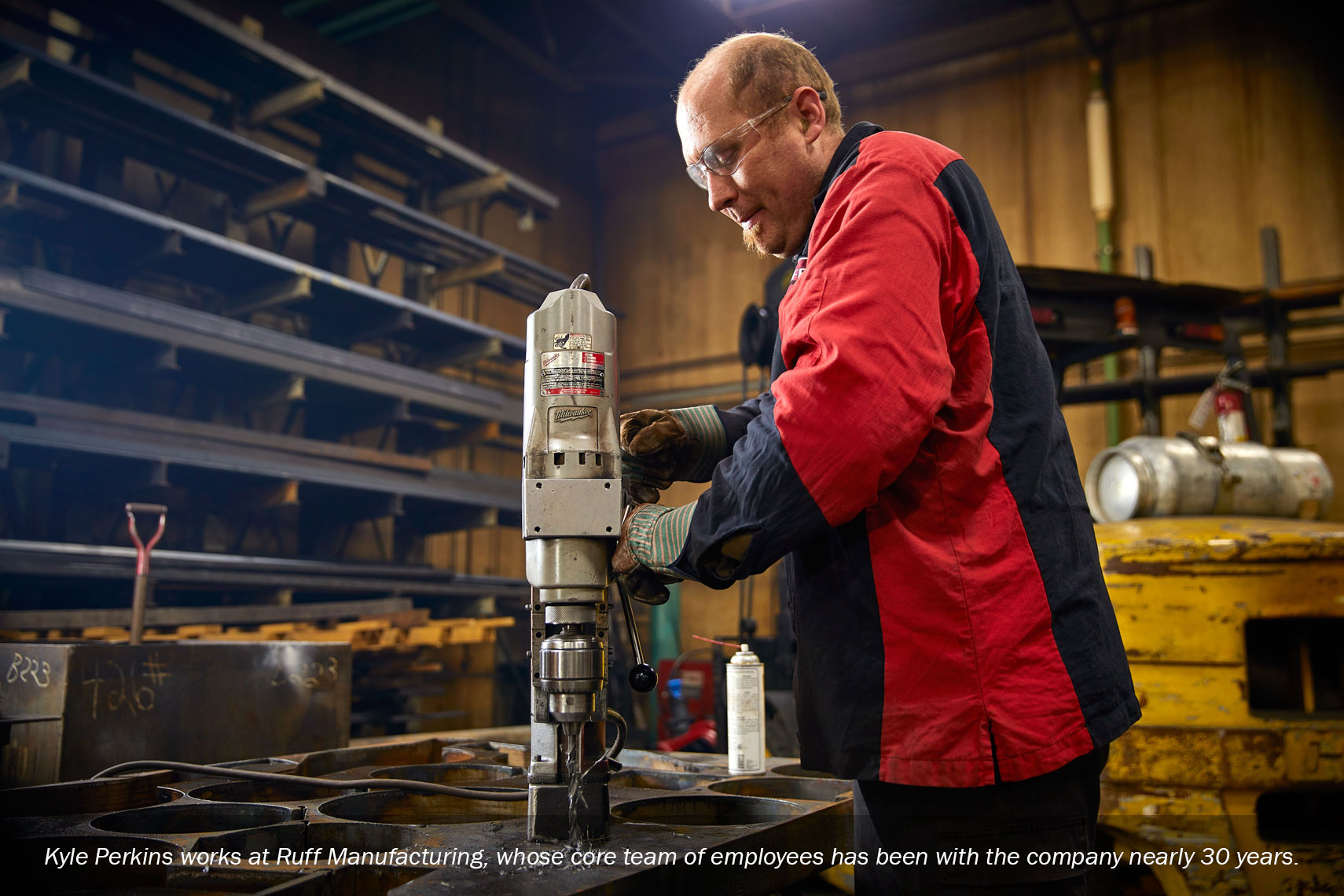
Berry worked with MidCountry Bank to apply for the Small Business Administration’s Paycheck Protection Program early in the pandemic. It received two PPP loans. The money meant the company could keep its entire team on payroll.
“That was the whole goal of the program, to keep people employed,” Franxman said. “It worked extremely well. After the first round of PPP loans, we were able to do the second round much more efficiently, and it saved a lot of companies.”
Plans for growth
Like many small business owners, Berry wears many hats. Owner and founder may sound glamorous, but many days that means driving a truck to make deliveries, serving as a machine operator and cleaning parts, while also being responsible for sales, marketing and administration. “When you’re running the company, you’re not just running a machine,” he said. “You’ve got a million things going on through your head. You’re trying to navigate through everything and plan ahead for six other guys to make sure they have work to do and keep things moving smoothly.”
Having strong relationships with professional partners, such as the one with MidCountry Bank, has been particularly helpful, Berry said. In addition to the PPP loan process, he worked with MidCountry to finance the buyout of his business partner, who was ready to retire. Today, Ruff Manufacturing is on pace to close 2022 with $1.8 million in revenue.
As Ruff Manufacturing heads into 2023, Berry sees more growth on the horizon. The business has been taking on more machining work and expanding its Blanchard grinding department, which creates a flat surface on steel plates.
Most of the company’s sales come from word of mouth. “We treat everybody the same way,” Berry said. “If a small company calls and wants something done in a day, we do it, and if a big corporation wants 100 pieces done in a couple of weeks, we'll do that, too.”
Obtaining enough material from a tight supply chain – and, of course, more employees – are the only constraints, Berry said. “For me, our growth potential is unlimited.”
Source: Minneapolis St. Paul Business Journal and Lauren Lawley Head – Contributor
_________________________________________________________________________________________________
Finding New Purpose
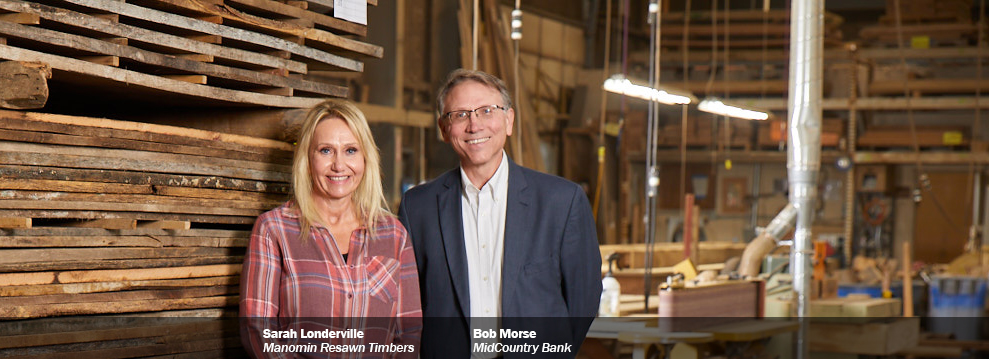
Manomin Resawn Timbers is a thriving building materials company specializing in repurposed wood that has attracted a national audience. What started as a small local operation based out of Hugo, MN is expected to grow exponentially in the years ahead, as the company diversifies from residential projects into commercial applications. Punch Pizza, Ralph Lauren’s 5th Avenue, New York showroom and various stadiums and airports showcase the Manomin product as the rustic look continues to appeal to a broader market.
Manomin’s core product line is antique wood flooring, with wood paneling, timbers and custom applications such as doors, furniture and fireplace mantels milled primarily from reclaimed barn wood rounding out other sought-after finishes.
Leveraging years of experience and testing, wood timbers and boards are carefully reclaimed from turn of the century barns, outbuildings and industrial spaces. Applying modern technology, the wood is de-nailed, treated and prepared in a way that preserves the age-old patina while providing a reliable building material that is free from toxins and parasites.
Manomin has laid impressive groundwork for a Minnesota-grown company that employs 16 full time employees. With the recent expansion into commercial project lines quickly driving 30% of its revenue, MidCountrty Bank has been alongside her, providing key financing and business planning resources that help her manage for the long term. Robert Morse, Business Banker for MidCountry Bank commented, “Sarah has shown leadership and resilience during challenging times. We look forward to seeing her continue to grow.”
Londerville recognizes the opportunity to leverage the talents of the millennial workforce, and has already begun to tap this resource. Manomin expects to benefit from this approach strategically by engaging a demographic known for environmental and socially conscious leanings. The fit goes beyond mission/vision/values by building bench strength in technology, marketing and R&D.
The popularity of reclaimed wood as a design feature, proliferated by HGTV programs such as “Fixer-Upper” has fueled competition in recent years. Most competitors find out quickly that what seems so simple is not. Owner Sarah Londerville attributes her success in part to her intense work ethic, cutting her teeth at a young age in scrapyards and learning how to work with a broad spectrum of people in her business dealings. Not only did her experience instill core values that drive her business model today, it has required her to be more resourceful. Over time, she has learned to diversify her product and recognize design trends early that allow her to adapt sales strategies.
Additionally, Londerville’s focus on quality has given her the confidence to position Manomin’s product in a way that is not price driven. She offers consultation and is willing to walk away from a sale rather than compromise on projects she knows are not viable. Manomin is a hands-on company that takes great care to understand customer needs, and to set appropriate expectations based on an intimate knowledge of the product. This approach has resulted in a growing portfolio of clients, builders and designers becoming advocates for the value and reliability of the Manomin brand.
_________________________________________________________________________________________________
Lifelong Learning Drives Business Success
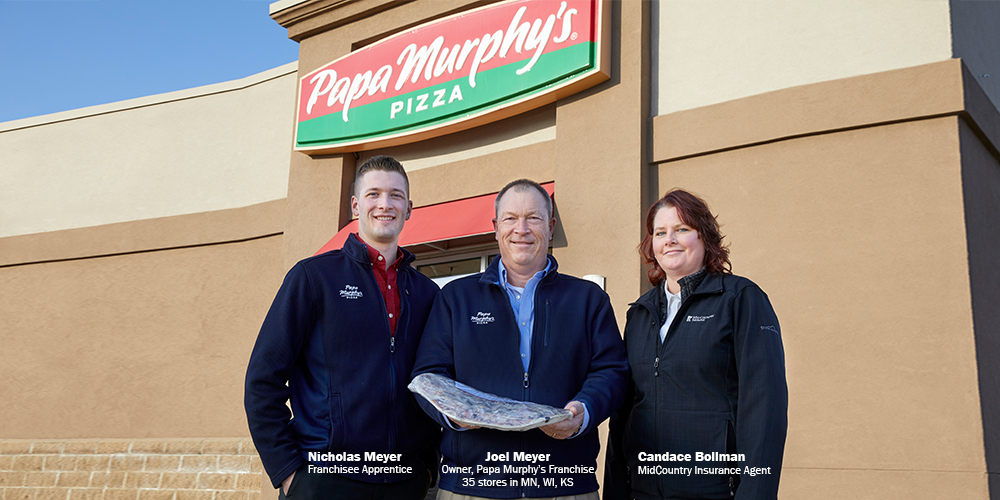
When you hear stories about the man behind the business, it is easy to see why Joel Meyer has found success in his ventures. He learned the value of hard work early in life, as his parents, both Minnesota educators, owned and operated a resort in central Minnesota near Brainerd. And even as he started his own teaching career in Litchfield, he had his sights set on “doing what Dad had done.” For Joel, his vision was more than nights and weekends. The math teacher put his analytics to work, spending nearly five years researching businesses that he felt would be viable opportunities. In early 1999, he found a match.
Papa Murphy’s Pizza was new to the Minnesota scene, but Joel liked what the brand and its high quality standards had to offer. The concept of “take and bake” was a good option for busy families who value fresh and healthier alternatives to feed their hungry mouths. As a teacher and football/wrestling coach, he knew the target market well, and decided it was a good fit for him. He and his wife Jane opened their first store in St. Cloud, MN only the tenth Papa Murphy’s franchise in the state.
Admittedly, it took a while to take hold. In his words, “the market was skeptical.” But take hold it did, and Joel continued to expand his holdings. In 2001 he opened locations in Alexandria and Brainerd. Then, in 2003 he expanded by making his first store acquisition in Fergus Falls, MN. Joel quickly shared that this store is one of his “favorites,” as its performance quickly doubled, then tripled in volume, truly showcasing what good management can do.
Fast forward twenty years, and Joel has grown his portfolio to 35 locations and nearly 400 employees, geographically dispersed in the Duluth/Iron Range area, central Minnesota, southern Wisconsin and Kansas. His own family has grown, and he is now proudly mentoring his son Nic in the finer aspects of business ownership, sharing that his “biggest joy is watching Nic outperform other stores and reach for more.” Nic is currently the store manager for Hutchinson, and also oversees the St. Louis Park location.
MidCountry Insurance Agent Candace Bollman approached Joel a few years ago to review his business insurance coverage and run comparisons against other carriers to make sure he was not paying too much. Candace offered that many business owners benefit from taking a new look at health coverage options. She elaborated, “With so much changing in the healthcare area in recent years, there are often ways to reduce cost or gain better coverage by updating your program.” This review resulted in a new employee group health plan for his full-time employees (same coverage, lower premium), and the beginning of a great insurance partnership. Since then, Candace has worked hard to find Joel other ways to support his business, structuring additional business liability programs for his expanding real estate holdings. Joel’s keen attention to cost savings opportunities, coupled with service and value play important roles in his decision making. Joel explained, “I had a long term relationship with another provider, which I was not disappointed in, but eventually shifted because Candace worked hard for it.”
That gives you a glimpse into what drives Joel Meyer. Joel continues to look for ways to improve his business operations and find new ways to drive profit. But he also enjoys the opportunity to teach. His jobs teach countless teens the value of hard work and responsibility. His son learns the sacrifice and rewards of building a business. And Joel looks forward to the day he can turn the franchise reins over to his protégé, and focus on managing his real estate holdings in his “retirement” years.
_________________________________________________________________________________________________
A Lesson in Resilience
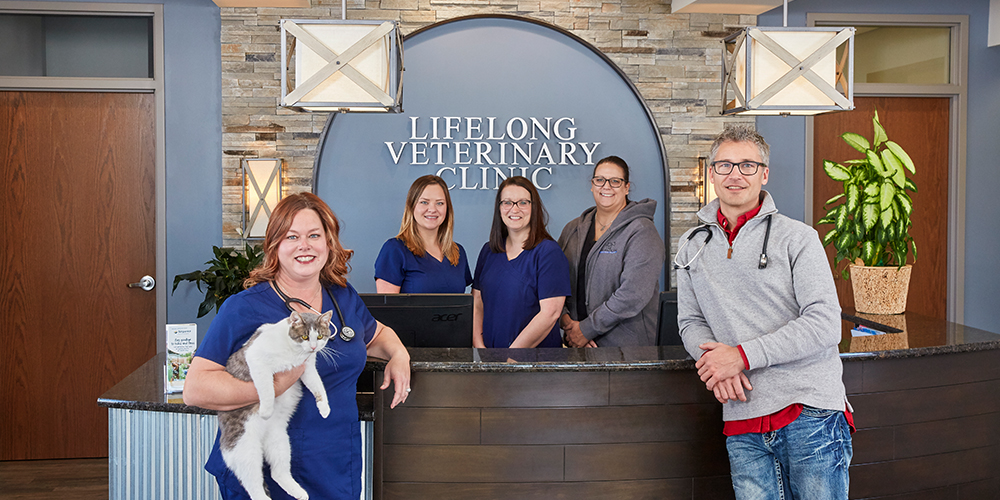 Left to Right: Dr. Angie (Ladwig) Gearey, Kenzie Ergen, Lindsay Miller, Heidi Schoenecker and Dr. Carl Larson of Lifelong Veterinary Clinic.
Left to Right: Dr. Angie (Ladwig) Gearey, Kenzie Ergen, Lindsay Miller, Heidi Schoenecker and Dr. Carl Larson of Lifelong Veterinary Clinic.
Like many industries, veterinary clinics are undergoing changes that provide both challenge and opportunity. For one local business, the vision of its owner has helped it achieve growth, even during these uncertain times.
While growing up in Bloomington, Minnesota, self-proclaimed “city kid” Carl Larson picked up a part time job cleaning kennels at a local pet hospital. This humble beginning taught Carl valuable lessons on how veterinary clinics work, sparked his love for the profession, and inspired the beginning of his career. It was midway through his studies in college that he recognized that applicants with farm experience on their resume held an advantage when it came time to starting veterinary school admissions, so he stayed with out-of-town family to connect with a mentor located in Watkins, MN.
What began as a way to enhance his resume exposed Larson to the world of “mixed practice” veterinary medicine, and set the path for his future. The Watkins clinic provided vet services to traditional household pets such as dogs and cats, but also supported production animals on farms, “equine athletes” (show horses), sheep, and goats, and other less common specialty vet services. Not only did this job shadow opportunity provide invaluable experience to enhance his academic studies, it exposed Larson to the need for vets in the field. He loved the diversity, and the ability to meet with his clients in their environment. The other strategic element that Larson observed was the fact that many veterinarians in the area were aging, and looking for a way to transition their practices and retire.
And so it began. Soon after graduating from the University of Minnesota Veterinary School in 2007, Dr. Carl Larson joined practice with the Watkins clinic he had mentored under. After 1 year as an associate, he became partner in the business he owns today. Similar expansions took place in Kimball and Litchfield. And when he saw a need but not a clinic, he used his experience and vision to launch startup clinics in Maple Lake and Hutchinson.
As he has grown his business, Larson has been particularly adept at leveraging and developing talent in his organization. Dr. Angie (Ladwig) Gearey worked in the Hutchinson market for ten years under another partnership prior to joining Larson’s practice in Kimball in 2014. Ultimately it was her dream to rebuild her practice in Hutchinson, and they worked together to find a solution that would help her fulfill that dream while supporting the growth of his organization. Dr. Angie worked with Larson to evaluate and select the current clinic location at 905 Highway 15 S, and develop their local business plan. To this point, Larson had worked exclusively with a large national bank, but he turned to MidCountry Bank for his expansion financing in Hutchinson. It was a natural fit, as the property selected had been a retired MidCountry Bank facility. Larson’s business banker had also moved on, allowing a new relationship to be formed with MidCountry a Bank’s Commercial Banker.
Since its launch in Hutchinson in late 2018, Lifelong Veterinary Clinic has proven that there was room for three vet clinics in town. The market is growing, and Lifelong is nearing a point where a second doctor may be added to support Dr. Angie’s expanding client base. Dr. Angie is proud of what they have already accomplished, as she shared, “Being able to provide veterinary service in the city I call home, and where I already have a relationship with most of my clients has been the best part of opening Lifelong. The name of the clinic, our interior design and most importantly our business motto focuses on the special bond between people and their pets. As such, we as a clinic also focus on the relationships we form with our clients. We want all of our clients to leave our clinic feeling like they are family and that we care for both them and their pets like our own.”
As with countless other service industries, COVID-19 has had an impact on veterinary clinics. As the pandemic took an early foothold and Minnesota Executive Orders were put into place, elective procedures were halted to preserve essential Personal Protection Equipment (PPE) until supplies could be inventoried and distributed as required. This immediately halted procedures such as spays and neuters, the “bread and butter” that pays the bills and keeps staff employed. The practice has had to close 2 clinics at different times due to COVID exposures, as well as accommodating several self-quarantine incidents with employees over the past months. Fortunately, the relationship established with MidCountry Bank helped Larson get quick access to the PPP funding, designed to support small business owners.
When the elective procedures were released again in June and July, the combined Larson clinics had over 1000 on the waiting list, a list that they worked all summer to get caught up on. Ironically, the stay at home order resulted in an increase in veterinary care overall, possibly due to the increased awareness of pet health issues while many are working remotely. The good news is Larson is navigating this pandemic effectively, with no furloughs or layoffs to his staff, and a steady demand on the horizon.
When asked what he is most proud of, Larson was remarkably humble in his response. His measure of success has been to “continue to achieve growth by helping others achieve their goals.” In an industry becoming infiltrated by corporate owned clinics, his ability to support local talent and provide mentorships to young veterinary students should be applauded. His goal to facilitate a path into practice without the financial hardship that often dissuades new veterinarians is truly a business model MidCountry is honored to support.
_________________________________________________________________________________________________
Sara Butruff and Travel Leaders
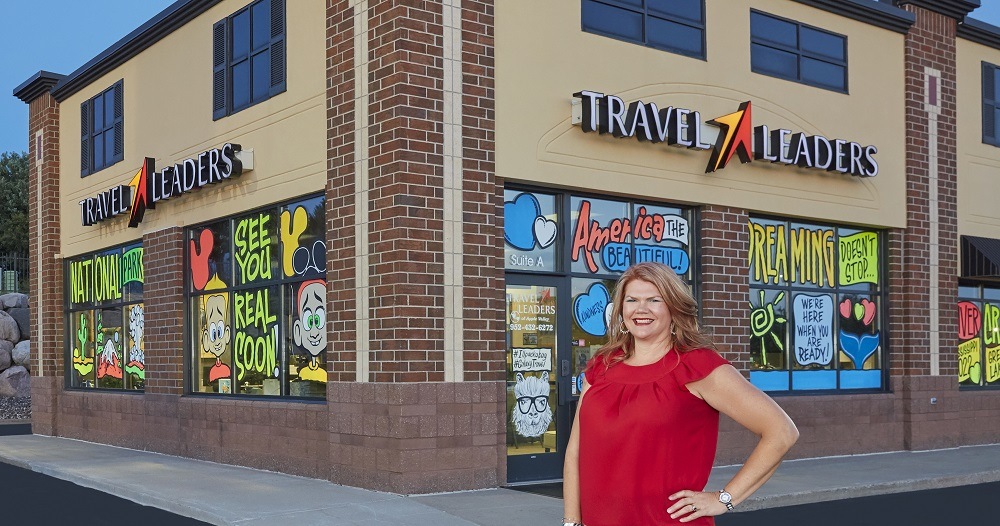 Sara Butruff is owner of Travel Leaders, an independent agency with offices in Apple Valley and Owatonna, Minnesota. She has been in business since 1999.
Sara Butruff is owner of Travel Leaders, an independent agency with offices in Apple Valley and Owatonna, Minnesota. She has been in business since 1999.
Sara Butruff has always been driven to help others, but after working hard to build a clientele in the travel industry, it was time to see her own dream become reality. Sara knew that in order to move up in her chosen profession, her best option was to be her own boss. So, nearly twenty years ago, she invested in her first agency, a Travel Leaders franchise located in the quaint downtown of Farmington, Minnesota.
Her work ethic paid off, and as her referrals grew, so did her business. Soon there was an opportunity to acquire an additional agency in Apple Valley, Minnesota and in 2005 Sara merged the operations together and moved to Apple Valley. More recently, she added a new location in Owatonna, Minnesota. When asked how she differentiates her services, Sara is quick to respond that, “It is all about being engaged”. Sara finds her niche in smaller communities where she can get to know folks, and provide a service that is not always available locally. With her values rooted deeply in community, Sara invests time as a Rotarian as well as being active in the local Chamber of Commerce. To Sara, this time not only fulfills her desire to help people, but serves as her best marketing strategy by showing her community that she is “good people”. That kind of thinking is important to the Midwest culture, after all!
The year 2020 hit the travel industry hard as COVID-19 took hold of our nation, and Travel Leaders was not spared. Sara acknowledged that it has been a challenge as a business owner. “The Payroll Protection Program (PPP) offered by the SBA has been crucial, and the expert guidance of Lisa Franxman (MidCountry Bank) was instrumental in helping me to receive the funding I needed to support my business.” For now, Sara focuses on what she can control. She, like many other businesses navigating COVID-19 has had to make some tough decisions to adjust to the current reality. Still, she is optimistic that medical advancements will eventually help her return to helping her clients plan the trip of their dreams. Undoubtedly, there will be more than a few that are ready to venture out!
Learn More About:

 Login
Login